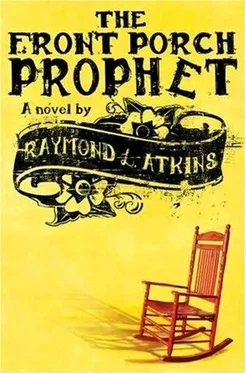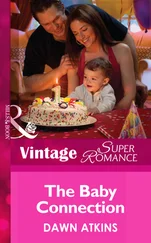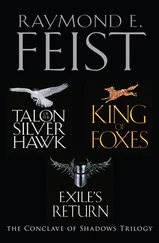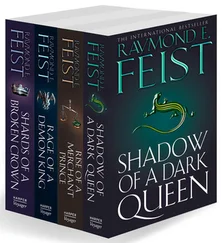“Save your money. I don’t have anything but the children, and you can have them.”
“Just forget it.” A.J. got up and poured them both coffee. “Let’s go to the porch.”
They sat in silence in the big rockers on the porch and enjoyed the twilight. The evening was serene. The slightest of breezes was blowing, bearing the hint of meat cooking on a grill. Estelle was burning yet another steak on her high-botch-ee.
“I missed you,” said Maggie. “Did you have fun being a bachelor while we were gone?”
“It was one party after another. I vacuumed about two truck-loads of blond stewardess-hair out of the carpet right before you got here. By the way, if you happen to find a pair of red panties somewhere in the house, they’re mine.”
“Red has always been your color,” she replied. “But I think you’re lying. I think you worked, went and saw Eugene, ate some fried Spam, and missed me.” She reached and took his hand. “But if you are messing around with a blond stewardess, you had better get in the habit of calling her a flight attendant, Plow Boy.”
“There are too many rules these days,” he responded forlornly. “Actually, you hit it pretty close, but you left out the part where I got fired.” She momentarily assimilated this data.
“Well, it’s not like we didn’t know it was coming,” she said finally. “Did you get the severance pay?”
“I got part of it. I still need to look up John McCord.”
“That’s it, then. I’m glad you’re out of there. I’ve never liked that place, and I’ve always believed you could do better. You rest for a few weeks. Then we’ll get busy finding you something else.” She sounded upbeat as she squeezed his hand.
“You know, I might not find something right off,” he cautioned. He did not want to dampen her optimism, but facts were facts.
“You have nearly a year’s pay in your pocket, counting what John McCord owes you,” she said. “You’ll find something before it runs out. I think you should start that remodeling business you’ve been talking about. There are enough old houses in bad shape in these mountains to keep you busy until you’re ninety.”
It was true. History was ignorant and had a mean streak, so it tended to repeat. Sequoyah and the surrounding areas had been rediscovered by the great-grandchildren of the elite who had once had their summer homes in the mountains. Young professionals had been snatching up property left and right, and the right local boy who could fix up an old house could certainly capitalize on the situation. He and Maggie had already turned down two fairly substantial offers on the Folly, tendered by individuals who wanted to live in a restored home without actually having to restore it. A.J. was fairly tolerant of this new breed of Sequoyites, all things considered, even though he had almost been hit once by a rogue Volvo, and in spite of the fact he no longer knew the names of everyone having Saturday morning coffee down at The Lord Is My Shepherd; I Shall Not Want Thick and Frosty Milkshakes Drive-In.
“Maybe,” he said, in response to the remodeling proposal. “We’ll see.” They finished their coffee in comfortable silence. As the night descended, a mist stole across the high valley and crept onto the porch. Maggie shuddered.
“Goose walk over your grave?” A.J. asked.
“It’s going to get cold early this year,” she responded.
“I think it might,” A.J. said. “It’s about time for it anyway. Halloween’s next week.” This was one of his favorite holidays, and he enjoyed immensely the ritual of dressing up to take the children out. Some of his more notable disguises were Richard Nixon, George Armstrong Custer the Day After, and a Rambler American, which was a great costume although a bit on the heavy side. This year he was planning to go as Nikita Khrushchev and was already beating podium-shaped objects with his shoe.
“Don’t remind me,” Maggie said. “I’ve got costumes to arrange.”
“What are we going to be this year?” he asked.
“I’ve got you to thank for this,” she said. “Most kids want to be ghosts or witches. Maybe a mime. But not my children. Nothing normal for them. Emily wants to go as Topo Gigio, Harper Lee wants to go as a fish, and J.J. wants to go black-and-white.”
“I don’t get that one.”
“You ought to get it,” she replied. “You started it when you told him the world used to be black and white. He said you even proved it.”
A.J. remembered. He and the children had been watching an old Basil Rathbone movie when J.J. asked why there was no color.
“The world used to be black and white,” he said to the children. “But aliens landed and zapped us with a color ray.”
“Uh-uh!” Harper Lee said.
“No way!” J.J. chimed.
“Daddy!” Emily added.
“I can prove it,” A.J. replied. He retrieved his videotape of The Wizard of Oz and plugged it in. The children watched open-mouthed as the film turned to Technicolor upon Dorothy’s arrival in Oz. “They were making this movie when the aliens landed,” he explained. “You can see right when we got zapped.” The young Longstreets were used to their father’s leg-pulling, and over the years he had made many an unfounded claim. But this time, it was different. They had seen the bona fides for themselves. There could be no doubt of the veracity of the claim. They believed.
“How hard can it be?” A.J. asked Maggie, referring to J.J.’s request. “Put him in black pants and a white shirt. A fish is going to be much harder.”
“Big talk, Nikita,” she responded. “He wants to look like he’s in a black-and-white movie. You know, that shades-of-grey, grainy look.”
“I have confidence in your ability,” A.J. smiled. “Maybe you can find him some size-four spats down at the Pic-N-Save.”
“Maybe you can quit filling their heads with garbage and make my life easier.”
“What do you want? An easy life or children who can think creatively?”
“Keep it up, and I’ll beat on you with my shoe,” Maggie said.
“Now, that’s more like it. Hold up while I go splash on a little Hai Karate.” He possessed what he believed to be the last bottle of the exotic fragrance extant.
“No, that’s all right. The fried Spam was bad enough.”
“I never admitted that,” he reminded her.
“You didn’t have to,” she reminded him back.
They lapsed into a contented repose and watched as the stars roused themselves for another night’s work. A.J. was glad to have Maggie back. Without her he was adrift in a world full of reefs. He no longer really understood where he left off and she began. She was the best person he had ever known, and he preferred her company above all others.
“How is Eugene?” she asked.
“He’s slipping fast,” came A.J.’s reply. He described the visit. She listened without comment, although her eyes mirrored sadness when he recounted the tale of Eugene’s reunion with Diane.
“I’m glad you made him come to town. I hope he and Diane made their peace.”
“They did,” he said. “He was low when I left him, but he asked me to go. He said he wanted to be alone.”
“Poor man,” she said simply. There was nothing else to say. Eugene had been a lucky man all of his life. Now his luck flowed away like water pouring from a hole in a bucket onto the sand in July. “You said Diane had company when you first arrived,” Maggie continued. “Who’s her new boyfriend?”
“I didn’t say a word about a boyfriend,” A.J. responded.
“But you said-”
“I said she had a friend. I did not use the word boy,” he replied.
“I’m missing you on this,” Maggie said, confused.
“I discovered Diane in a post-coital glow after having spent the evening with Truth Hannassey.” Truth had been among the first wave of new-and-improved Sequoyites. She had stumbled upon the little town a few years back and had fallen in love with its charm, beauty, and potential for financial gain. She had bought and restored a fine old home and from that base had proceeded to have her way with Cherokee County.
Читать дальше












